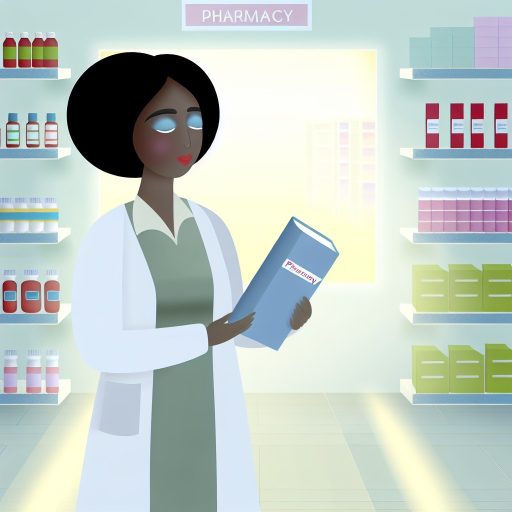Introduction
Pharmacology plays a critical role in public health in Nigeria by ensuring the safe and effective use of medications.
Understanding the connection between pharmacology and public health can lead to improved healthcare outcomes and overall well-being for the population.
This blog post will explore the importance of pharmacology in public health in Nigeria, emphasizing the significance of this relationship.
We will discuss how pharmacological knowledge influences healthcare policies, practices, and patient outcomes in the country.
The Role of Pharmacology in Public Health
Pharmacology plays a crucial role in preventing and treating diseases in Nigeria.
By studying the interactions between drugs and the human body, pharmacologists are able to develop medications that can effectively combat various illnesses.
Access to medications is essential for improving public health outcomes.
In Nigeria, many people lack access to essential medications due to barriers such as cost, availability, and distribution.
This leads to untreated illnesses and poor health outcomes in the population.
Pharmacology has made significant contributions to public health in Nigeria through various means.
One example is the development of vaccines for diseases such as polio and yellow fever, which have helped to prevent outbreaks and save lives.
Another example is the introduction of antiretroviral drugs for HIV/AIDS treatment.
These medications have significantly improved the quality of life for people living with HIV/AIDS in Nigeria and have helped to reduce the spread of the virus.
In addition, pharmacology has played a role in improving maternal and child health in Nigeria.
By developing medications to treat complications during pregnancy and childbirth, pharmacologists have helped to reduce maternal and infant mortality rates in the country.
Pharmacology plays a crucial role in public health in Nigeria by preventing and treating diseases, improving access to medications, and contributing to positive health outcomes in the population.
It is important to continue investing in pharmacological research and development to further improve public health in the country.
Challenges in Pharmacology and Public Health in Nigeria
- Ensuring access to quality medications for all Nigerians
- Counterfeit drugs and their impact on public health
- Lack of awareness and education about proper medication use
Ensuring Access to Quality Medications
One of the major challenges in pharmacology and public health in Nigeria is the issue of ensuring access to quality medications for all Nigerians.
Many individuals in the country struggle to afford essential medications due to high costs and limited availability.
This lack of access can lead to untreated illnesses, preventable deaths, and overall poor health outcomes.
Impact of Counterfeit Drugs
Another significant challenge is the prevalence of counterfeit drugs in Nigeria.
These fake medications pose serious risks to public health as they often contain harmful substances or incorrect dosages.
This can lead to treatment failure, drug resistance, and even death.
The widespread availability of counterfeit drugs undermines the effectiveness of healthcare interventions and puts the population at risk.
Lack of Awareness and Education
Additionally, there is a lack of awareness and education about proper medication use in Nigeria.
Many individuals may not understand the importance of following dosage instructions, potential side effects, or drug interactions.
This can result in misuse of medications, drug toxicity, and treatment failure.
A lack of education on medication safety and efficacy can also contribute to poor health outcomes and the spread of misinformation.
Addressing these challenges in pharmacology and public health in Nigeria requires collaboration between healthcare providers, policymakers, and the community.
Efforts should be made to improve access to quality medications, combat the spread of counterfeit drugs, and enhance awareness and education on proper medication use.
By working together to overcome these obstacles, we can improve health outcomes and promote well-being for all Nigerians.
Delve into the Subject: Nigeria’s Contribution to Pharmaceutical Chemistry Literature
Health policies play a crucial role in promoting the use of safe and effective medications in Nigeria.
Government regulations and initiatives significantly impact pharmacology practices in the country.
The Role of Health Policies
- Health policies set guidelines and standards for the procurement, distribution, and use of medications.
- They ensure that medications meet quality and safety standards to protect public health.
- Policies also regulate the advertising and promotion of pharmaceutical products to prevent misinformation.
Government Regulations and Initiatives
- The Nigerian government implements regulations to control the importation and distribution of medications.
- Initiatives such as the National Drug Distribution Guidelines aim to streamline the supply chain for pharmaceutical products.
- Regulatory bodies like the National Agency for Food and Drug Administration and Control (NAFDAC) oversee drug registration and monitoring.
Impact on Pharmacology Practices
- Government regulations ensure that only approved and safe medications are available in the market.
- Pharmacists and healthcare providers must adhere to these regulations to protect patients from harm.
- Initiatives promote the rational use of medications to prevent misuse and antimicrobial resistance.
Importance of Collaboration
- Policymakers, healthcare providers, and pharmaceutical companies must collaborate to improve medication access and affordability.
- Collaboration leads to the development of policies that address public health needs and promote pharmaceutical innovation.
- Joint efforts can enhance drug safety monitoring and encourage the use of evidence-based practices in pharmacology.
Health policies and government regulations have a significant impact on pharmacology practices in Nigeria.
Collaboration between stakeholders is essential to ensure the safe and effective use of medications for public health benefits.
Find Out More: Postgraduate Pharmacy Programs in Nigeria
Community Engagement and Pharmacology
Community engagement plays a crucial role in promoting better health outcomes through pharmacology.
- It allows for increased awareness of medications and their proper use among the general population.
- Pharmacists and other healthcare professionals serve as key educators in the community on medication-related topics.
- They play a vital role in ensuring that the public understands the importance of adherence to prescribed medications.
Role of Pharmacists in Educating the Public
Pharmacists are highly trained professionals who are well-equipped to provide accurate information about medications to the public.
- They offer counseling services to patients to ensure they understand their medications’ purpose, dosage, and potential side effects.
- Pharmacists also educate the community on the proper storage of medications to maintain their effectiveness.
- They play a crucial role in promoting medication safety and preventing adverse drug interactions in the community.
Examples of Successful Community Health Programs
There are several successful community health programs in Nigeria that incorporate pharmacological interventions to improve health outcomes.
Transform Your Career with Expert Guidance
Get personalized mentorship consulting that’s tailored to your unique path. Our expert advice is actionable and exclusive.
Get Started- One such program is the Community Pharmacy Intervention Program, which focuses on increasing access to essential medications in underserved areas.
- Another example is the Medication Adherence Support Initiative, which aims to improve patient compliance with prescribed medications through education and support.
- The Drug Information Center at a local hospital provides valuable resources and counseling to community members on medication-related issues.
Explore Further: The Importance of Clinical Pharmacy in Nigerian Healthcare

Research and Innovation in Pharmacology
Research and innovation in pharmacology play a crucial role in developing new medications and treatment strategies for public health issues in Nigeria.
Firstly, research helps to identify the root causes of health problems in the Nigerian population.
By understanding the underlying mechanisms of diseases prevalent in the country, researchers can develop targeted medications and therapies to address these issues effectively.
Secondly, innovation in pharmacology leads to the discovery of new drugs and treatment approaches that can improve healthcare outcomes for Nigerians.
These innovative solutions provide alternative options for patients who may not respond well to existing treatments or medications.
- Collaboration between researchers, pharmaceutical companies, and healthcare providers is essential for advancing pharmacology practices in Nigeria.
- Researchers rely on pharmaceutical companies to bring new medications to market, while healthcare providers play a crucial role in implementing these treatments in clinical settings.
- Working together, these stakeholders can ensure that the latest advancements in pharmacological research are translated into real-world benefits for public health in Nigeria.
Recent advancements in pharmacological research have already begun to benefit public health in Nigeria.
For example, the discovery of new antimalarial drugs has helped to reduce the burden of malaria in the country.
Additionally, research on infectious diseases has led to the development of vaccines that protect against illnesses such as meningitis and yellow fever.
These breakthroughs have saved countless lives and improved the overall health of the Nigerian population.
Research and innovation in pharmacology are essential for addressing public health challenges in Nigeria.
By promoting collaboration and showcasing recent advancements, we can continue to improve healthcare outcomes and enhance the well-being of all Nigerians.
Delve into the Subject: Nigerian Pharmaceutical Tech Companies to Watch
Pharmacology and public health in Nigeria are interconnected.
Understanding this connection is crucial for improving health outcomes.
Further research and collaboration are needed to enhance pharmacological practices in the country.
Additional Resources
Department of Pharmaceutical Science
Non‐compartmental and population pharmacokinetic analysis of …




